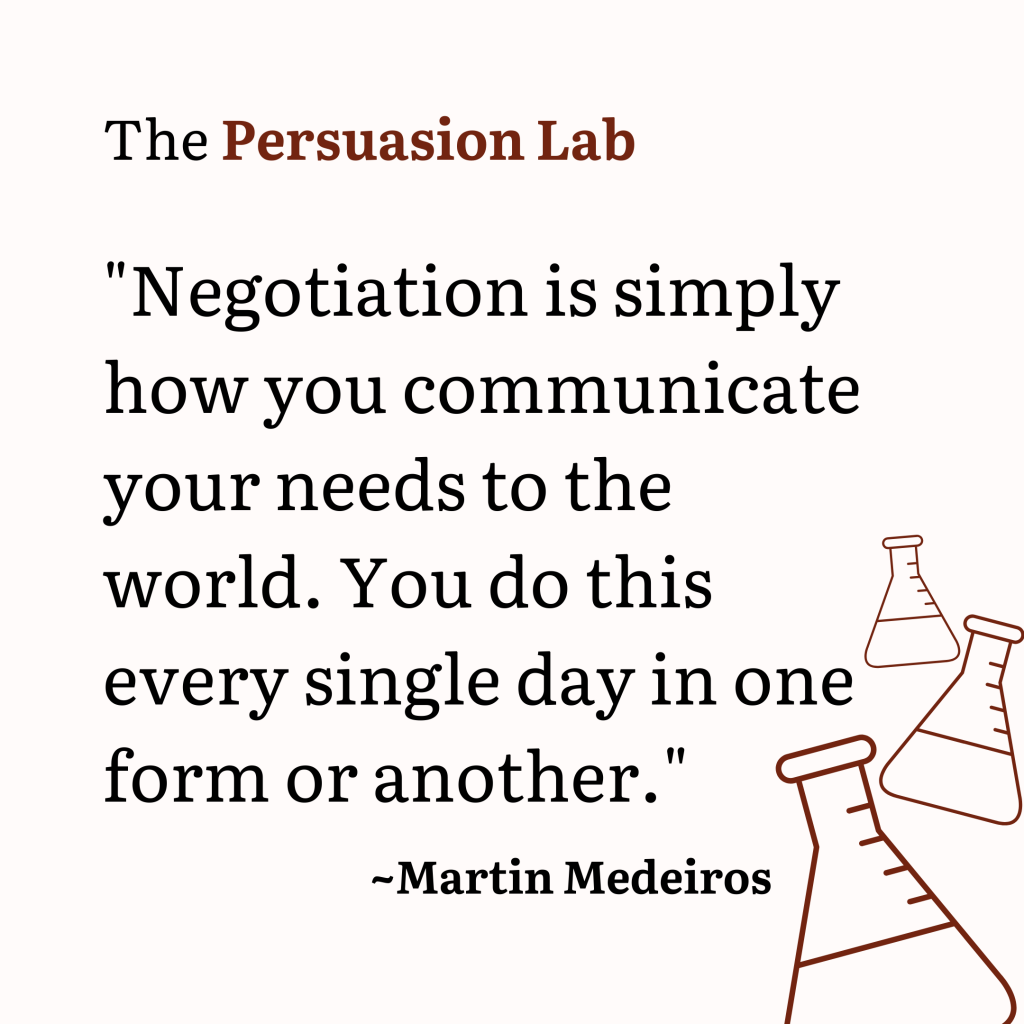Way back in the days of in-person presentations and workshops, the #1 objection to my presence: “This is great for someone in sales or whatever, but I don’t negotiate.”
To which I ask the following questions:
- Do you have a spouse or significant other?
- Do you have children?
- Do you have friends who you’ve ever tried to pick a place to eat with?
- Do you supervise or work with team members?
- Are you interested in effecting change at local political levels?
- Do you deal with office politics?
- Do you interact with board members or shareholders?
While it is more obviously true that folks in sales, mergers and acquisitions, procurement, etc negotiate all day everyday to make their living, so do you. It looks different, and may be less obvious, but is nevertheless true.
With that in mind, let’s explore some of the nuance.
Spouses and significant others
This should be obvious if you’ve been in any kind of relationship at any point in your life, but let’s spell it out for clarity’s sake.
How do you divide household responsibilities?
If you are the tidier of your relationship, how do you get your spouse to: pick up their clothes off the floor, fold the laundry when it’s clean, put away their dishes, wipe down the counter after making a sandwich… etc, etc etc.
OR, way back in the days of travel, how do you persuade your person to go along with you to your chosen destination?
Say you want Chinese takeout for dinner and your spouse wants Thai… What are you getting?
If you’re aware that these are all negotiations and persuasions, you’ll use some tried and true tactics: make the conditions of acceptance easy, reframe the issue at hand, make your problem the other person’s problem, etc (for more on tactics, check out this book).
If you’re still in the dark about the fact that you are, in fact, locked in a negotiation with your spouse day in and day out, well, you’re both wrong and likely fairly unsatisfied with your relationship in one way or another.

Teens
So, again, this should be painfully obvious. You want your teens to make excellent decisions whether or not you’re around.
Of course, you’ve done your best to instill positive values, lead by example with your own decision making, and keep an eye on what they’re up to more often than not.
Those moments arise, sooner or later, when your teen is on their own and must make decisions one way or another.
Parenting teens is an expert level course in the practice of both persuasion (see the themes above) and pre-suasion. You want to prep them before they have to make a call, so that they will make the best decision at that moment, despite the fact that their brains just aren’t fully online until their mid 20’s. (HELLO frontal lobes!!!)
So, aware that your interactions with your teen are in fact a negotiation exercise, you use tactics like: building the relationship and asking open ended questions to gather their perspective (what do you think about folks using marijuana/alcohol/insert questionable substance here?), making extremely precise requests (I expect you to be home by 10:00), exercising your power by giving privileges based on desired behaviors (If you meet curfew tonight, we’ll get [favorite dinner] tomorrow), asking “Are you telling me the truth?” and many, many more besides.
Co-Workers/Subordinates/Managers/Team Members
When was the last time someone at work did a task precisely how you wanted them to, in the timeframe you needed it, without you asking?
I’m guessing, oh, never.
Same.
Because negotiation is how you communicate your needs to the world.
If you don’t say what you need, you’re not going to get it.
What changes when you see these interactions as a negotiation?
Well, as we’ve already discussed, you can start to use your words on purpose to get folks on board for what you need to do your job effectively.
It can be as simple as giving a reason for your request. The shocker? It doesn’t even have to be a real reason. One study out of Harvard looked at folks cutting in line to make copies at the office. If folks just try to cut in, no dice. Back of the line, Buster.
If folks ask “Oh, do you mind if I get in front of you?” and add a reason like “I only have one page I need to copy” they’re more likely to get a ‘yes’ and get their copies and be off.
If folks ask “Oh, do you mind if I get in front of you?” and add a reason that has absolutely nothing to do with copies (“My kids are sick.”) they get the exact same rates of ‘yes.’
Of course, when it comes to team members, you want to be as thoughtful as possible to maintain levels of motivation, productivity, and quality of work as high as they can be. Nevertheless, give a reason why. Ask open ended questions. Build the relationship outside of just the professional goings on.
Communicate your needs so that they can be met!
Whatever your level and familiarity with negotiation and persuasion, we have something for you at The Persuasion Lab. If you’re ready to dive in and level up your skills, get on the waiting list for the Premium PLUS Membership Community here.
You can hear more about unlikely ways you do, in fact negotiate every day on Episode #57 of The Persuasion Lab Podcast, which can be found on Apple Podcasts, Spotify, Buzzsprout, or wherever you get your podcasts!

